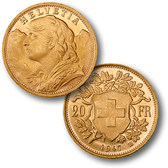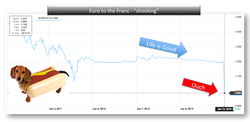
If you weren't paying attention last week, you may have missed it. Something quite dramatic took place. On Thursday, the Swiss franc was allowed to float on the market by the Swiss central bank. The euro plunged against the franc, going down by nearly 28% as the news broke. The franc had been pegged, for three years, to the European common currency (Euro) at a minimum rate of 1.20 francs to the euro. The move came as a result of the central bank chief Thomas Jordan's feeling that holding down the Swiss currency was no longer needed. A robust franc could have a dramatic impact on the country's economy. Expect the Swiss business and tourism sectors to get hammered by falling sales. The move was almost unheard of among the most widely traded currencies of advanced economies.

Swiss businesses are bracing in anticipation of plunging exports as Swiss goods become more expensive. Shoppers at home are flooding across the borders to neighboring erozone countries for cheaper goods. With the stronger franc, it will be difficult to keep the Swiss at home given the strong purchasing power just created. Foreign-exchange brokers, who had relied on the stability of the franc, were all blindsided as millions of dollars were lost around the world. The UK-based FX broker Alpari Foreign-exchange brokers and New Zealand's Excel Markets had become insolvent in a matter of minutes. Everest Capital's Global Fund is closing its largest hedge fund after losing $830 Million in assets. These will not be the last of the casualties.
Great chocolate, precious timepieces, legendary bank accounts, fascinating transportation system, another economy on the rocks. Sua Sponte.
Bradford C. Bruner for Sua Sponte Wealth Management
Great chocolate, precious timepieces, legendary bank accounts, fascinating transportation system, another economy on the rocks. Sua Sponte.
Bradford C. Bruner for Sua Sponte Wealth Management

















































